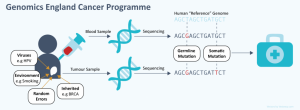Cancer starts in our cells. Cells are tiny building blocks that make up the organs and tissues of our body. We have about 10 trillion cells in our bodies.
Usually, our cells divide to make new cells in a controlled way. This is how our bodies grow and repair.
Inside almost every cell of your body is a copy of your genome, made of DNA. The genome can be thought of as the instructions for running a cell. It tells the cell what kind of cell to be – is it a skin cell or a liver cell? It also has the instructions that tell the cell when to grow and divide, and when to die.
When a cell divides to become two cells, your genome is copied. Sometimes when our cells divide, mistakes happen when copying the genome. These are called mutations. They are caused by natural processes in our cells, or just by chance. They can be caused by external factors in our environment too – like radiation from sunlight.
Usually, cells can repair mutations in their genome. In fact, most DNA damage is repaired immediately, with no ill effects. If the damage is very bad, cells may self-destruct instead. Or the immune system may recognise them as abnormal and kill them. This helps to protect us from cancer.
But sometimes mutations in critical genes mean that a cell no longer understands its instructions, and starts to multiply out of control. It doesn’t repair itself properly, and it doesn’t die when it should. The abnormal cell keeps dividing and making more and more abnormal cells. These cells form a lump, which is called a tumour.
In the 100,000 Genomes Project, we sequence the DNA from both the tumour and healthy cells. This means we can compare the two.
Cancer whole genome sequencing allows us to detect two types of changes, germline mutations and somatic mutations.
Germline mutations
These are changes that are inherited from your parents, or that occur spontaneously in very early development of the foetus.
These changes to the genome don’t match the human reference genome that we use for a guide.
They are often passed down through generations. They can affect your chances of developing cancer, for example changes in the BRCA1 and BRCA2 genes can lead to an increased risk of breast and ovarian cancers. We look for these changes if they are thought to be the cause of someone’s cancer.
We can also look for these changes in patients who don’t have cancer – but only if they want us to. In this case these are called ‘additional findings’. Read more about additional findings.
Somatic mutations
These are changes that occur in the genome of cancer cells. Somatic mutations can be caused by environmental factors. For example, damaging UV rays from the sun cause changes of the C base in DNA to a T, which can lead to tumour formation. These can be detected by whole genome sequencing, by comparing the sequence from the patient’s blood sample and the sequence from a sample of their tumour.
We can also detect changes to the cancer genome caused by a range of other environmental factors, such as smoking, and viral infections, or the random changes that occur when a cancer is rapidly expanding.
Patient care
Both somatic and germline mutations are important when we consider a patient’s care.
In the 100,000 Genomes Project, we sequence the DNA from a patient’s tumour and healthy cells. We compare the two sequences. This gives insight into the exact nature and genomic changes that are causing an individual’s cancer.
This information can improve diagnosis. It can also help clinicians to select the treatments most likely to be effective in each individual case. WGS can also show which patients are not likely to benefit from a specific treatment. This can save unnecessary treatments and toxic side effects. Genomics makes personalised medicine possible – with a real impact on patients and their health outcomes.
By the end of the Project we aim to return whole genome sequencing (WGS) results to people in time to help with their care. During the early stages of the cancer programme, most patients taking part will not benefit personally. But taking part will improve our understanding of cancer, enable research and improve care for the future.
Useful links
Visit the Cancer Research UK website for more resources on genetics and cancer.


